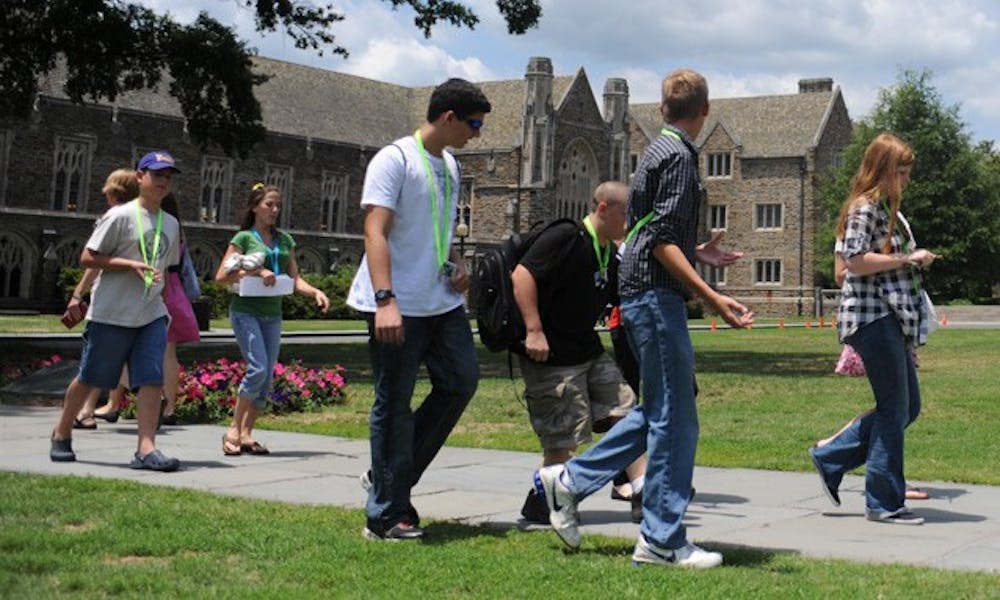Although the economic recession sparked some sacrifice across the University, Duke’s revered Talent Identification Program has continued to grow during the past several years.
Targeted at academically gifted students in grades four through 12, Duke TIP, a nonprofit organization, is a series of educational camps and talent searches—programs which invite students to take the SAT before entering high school.
Since the beginning of the financial crisis in 2008, the TIP budget has increased by 37 percent, said TIP Director Martha Putallaz, noting that TIP is funded purely by external donations and receives no funding from the University.
“We actually worried in 2008, what the economic downturn would bring—would people be willing to pay the tuition,” Putallaz said. “We’re one of the few units on campus whose budget has grown.... For whatever reason, our market has proven to be incredibly resilient.”
The budget’s increases have also allowed for new programming and contributed to a rise in the number of TIP participants, she added. The educational camps hosted 5,068 in 2011, an increase from 3,011 participants in 2005.
Putallaz said TIP’s financial stability comes from high alumni interest and a well-planned scholarship endowment, established at the program’s creation in 1980. TIP stresses the importance of financial aid to alumni so that they might contribute to need-based scholarship funds. Last year, TIP awarded upwards of $3 million to more than 16,000 students for participation in educational and talent search programs.
TIP Marketing Manager Emily Swartzlander said TIP’s commitment to financial aid and parents’ commitment to their children’s education are two of the main causes for increased participation despite the economic downturn. As financial restraints have forced many schools to cut gifted programs, parents are turning to TIP for supplemental educational opportunities, she added.
“Parents are always interested in their kids’ education,” Swartzlander said. “It partially helps us that the service we’re providing is something parents are going to want, regardless of what the economy looks like.”
Expanding across the globe
In addition to a college-like academic program in Durham every summer, many TIP students attend programs elsewhere. Currently, programs attracting both American and international students are based in California, Florida, China, Italy and several other locations.
TIP in India, which was established in 2007 and targeted specifically at Indian students, is the first Duke program to be established in India, Swartzlander said. She added that TIP program directors work closely with various Duke schools and departments, such as the Fuqua School of Business, so that their global ventures align with the University’s mission.
In a parallel to the Univeristy’s global ventures, such as Duke Kunshan University and the Duke School of Medicine’s partnership with the National University of Singapore, TIP is extending into new areas. TIP is creating a program in Singapore and expects to start enrolling students in 2012, said Nicki Charles, TIP assistant director of field studies and institutes. TIP administrators also hope to begin another China program in 2013 at Duke Kunshan University.
Charles added that TIP is working to improve its relations with international feeder schools, in order to attract more foreign students to American TIP programs.
“International education is not always dependent on having Americans go [abroad], but sometimes bringing the international students to America,” Charles said.
Not a “vehicle for recruitment”
Although spending time at Duke as a middle or high school student is an “obvious selling point,” Swartzlander said TIP makes a conscious effort not to actively promote Duke as a future college option to TIP participants.
Putallaz said a study conducted by TIP and the Office of Undergraduate Admissions found that 24.3 percent of Duke freshmen from 2008 to 2011 took the SAT through a TIP talent search, though only 5.25 percent had participated in a TIP educational camp. She noted that participating in a TIP program does not give students a specific advantage when applying to Duke more than any other academic achievement would.
“Duke TIP is another demonstration of an academic honor, but it doesn’t push them to the top of the admissions loop at all,” Pautallaz said. “We do not ever want to be seen as a recruitment vehicle for Duke, and [Dean of Undergraduate Admissions Christoph Guttentag] is under no obligation to accept TIP students.”
Incoming freshman James Kennedy, who participated in a TIP educational camp in 2008, said he loved Duke before attending TIP, though added that the program helped him solidify the University as one of his top college choices. The classes he took that summer also aided him in his decision to study neuroscience.
“Everything about TIP was extraordinary,” Kennedy said. “It did a great job of translating people out of a normal school mindset and into a living [while] learning mindset.”
Get The Chronicle straight to your inbox
Signup for our weekly newsletter. Cancel at any time.

